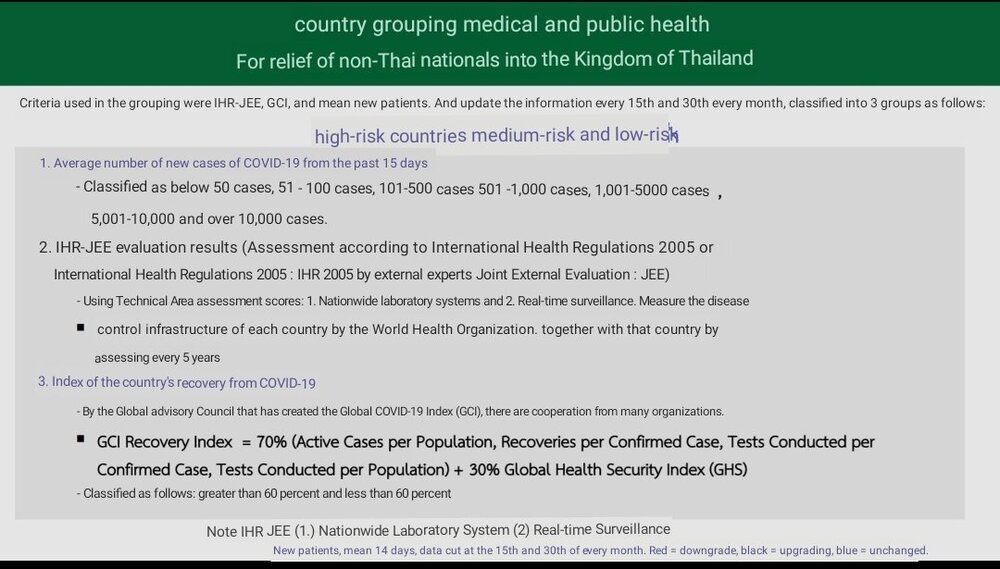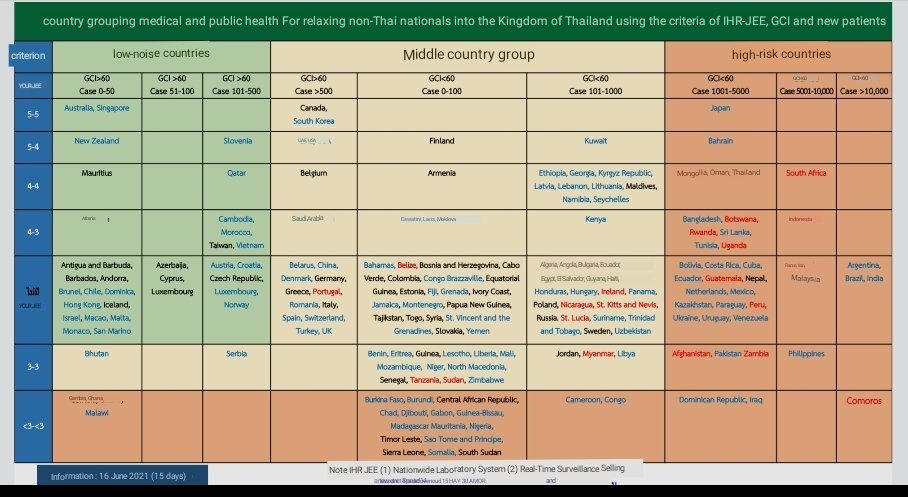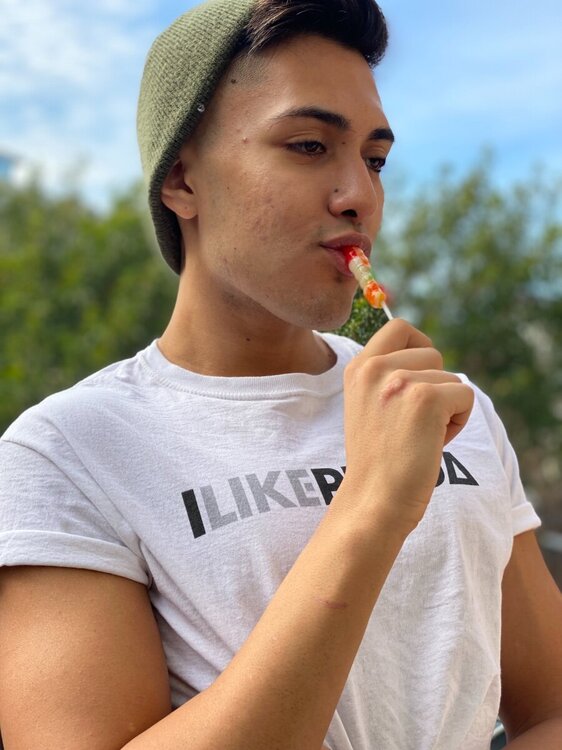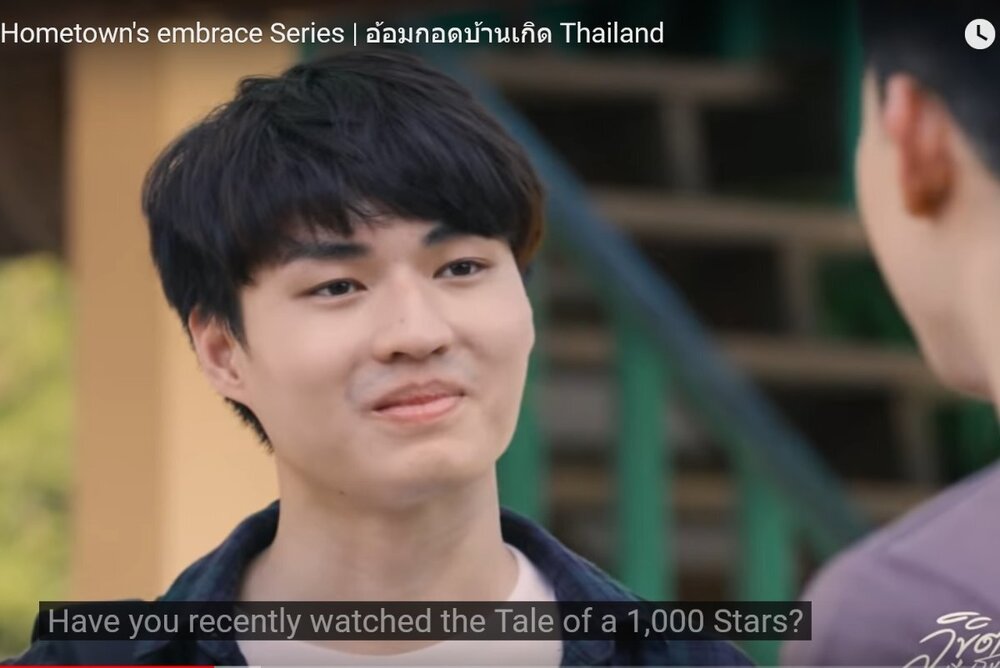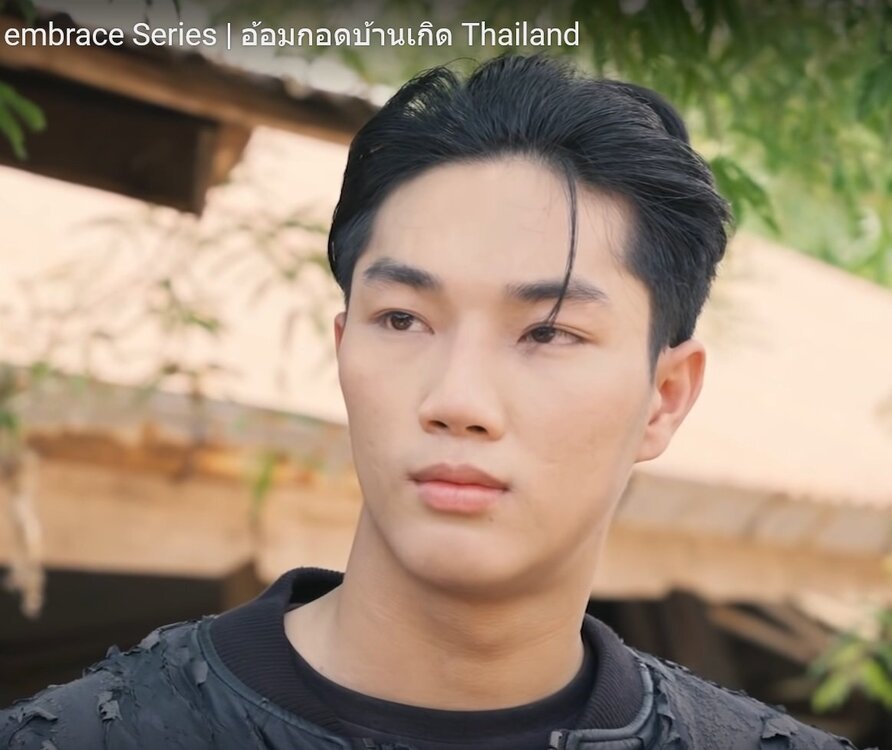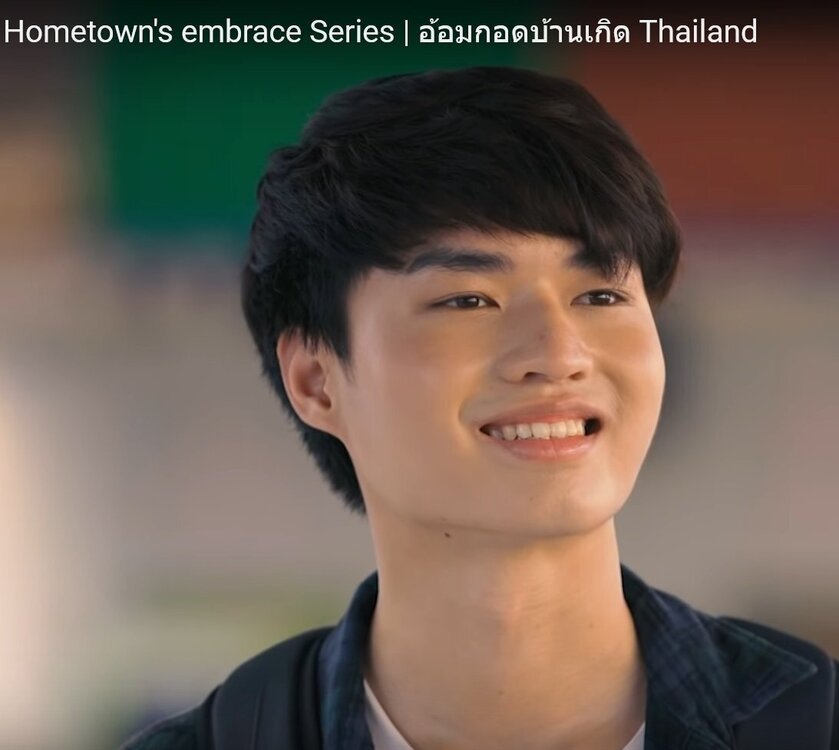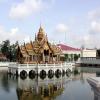Leaderboard
Popular Content
Showing content with the highest reputation on 06/26/2021 in all areas
-

POST COVID TRAVELING
Latbear4blk and one other reacted to fedssocr for a topic
Sadly I don't expect to go anywhere until next year some time. As much as I'd like to go back to Thailand, I think it will probably be Taiwan and South Korea for me. And maybe Japan if they get their act together. I really like Korea a lot. I've spent a couple of weeks in Seoul and several days in Busan in recent years. Seoul is enormous so I've barely scratched the surface.2 points -
POST COVID TRAVELING
Latbear4blk and one other reacted to PeterRS for a topic
I also voted 'Other'. I would have preferred one selection either being 'Asia' as a whole or adding in 'North Asia'. I live in Thailand and I will be visiting Japan and Taiwan just as soon as it becomes possible. I may also add in South Korea not having been there for about 15 years.2 points -
Ever since my first visit to Thailand decades ago I have been amazed at the welcome given to gay men and women and the seeming openness of gay life. At the same time I have learned and seen evidence of the relative homophobia in much of the country and discrimination in certain sections of society against homosexual individuals. I have also seen the gradual disappearance of many Thais who used to visit the bars in the 1980s and the 1990s, as well as the country boys working in many of the bars being replaced by those from neighbouring countries. In response to all these I have seen many western-style views expressed in explanation – especially rapidly rising incomes as Thailand’s economy has developed making it less attractive for young Thai guys to work in the gogo bars. I have always thought approaching Thailand’s culture and sexual morality from a western perspective wrong. A few years ago I tried to do a little research. I did find on the internet one fascinating article by the Australian Professor Peter Jackson who has written a whole series of articles and books on sexuality and queerness in Asian countries. Yesterday I tried to find that article again – without success. But I did eventually find an even longer one that focuses almost exclusively on Thailand. It is very long but I found it totally fascinating. I had intended to quote sections from it in a special post here. By the time I was half way through the article, I had way too many words. So I decided to paraphrase some of its more key moments, with sections in quotation marks being direct quotes from the article. Essentially what Jackson stresses is that western influences and a desire for acceptance by the West have had and continue to have an especially serious effect on traditional Thai cultural and sexual norms. This was very typical in countries subject to colonization. But Siam was never colonized. Why, therefore, the similarity? Strikingly, the main changes in terms of homosexuality did not start to appear until the mid 20th century and they started internally within the country. “The key finding of my earlier studies is that despite the global spread of Western power and the intensity of homophobic discourse in the early modern West, these discourses failed to register in Thailand or to be communicated through local networks of discursive power until the 1960s.” Back in the 1800s Thailand had a very homogenous society. Men and women dressed naked from the waist up. They wore virtually similar hairstyles. It was often difficult to tell men from women. This contrasted greatly with western habits where it was all but impossible not to tell a man from a woman. “With respect to gender and eroticism, Western visitors consistently made three main critiques that were taken of Siamese barbarism and lack of civilization . . . (1) the ‘nakedness of the Siamese body [above the waist]; (2) the sexual ‘excesses of polygamy; and (3) the similarity in appearance of Siamese men and women, accentuated by a lack of differentiation between male and female fashions and hair styles . . . “ That anti-colonial stance had come to the fore particularly during the reign of King Chulalongkorn (1868-1910). Historically, as Siam opened up trade to the West, two factors contributed to this change. The first was that, as had happened in China by force, Siam peacefully permitted foreign traders to be based in Siam under their home countries laws. European nations and America regarded Siam’s traditional laws as barbaric and refused to allow their nationals to be subject to them. Secondly it was King Chulalongkorn who realised that the disparaging tone of Western nations about what they alleged as Siam’s primitive barbarous customs and religion, a view expressed vociferously by Christian missionaries, could have negative international consequences. The King was aware that International Law only protected so-called “civilized nations.” There was concern that Western nations might seize Siam under the pretext of the country’s alleged backwardness. The King realised that Thailand had to change and become on the face of it more western looking. “Thai social critic Sulak Sivaraska labeled Chulalongkorn’s self-civilizing anti-colonization strategy as ‘fighting wolves by donning their clothing.’” The campaign to westernize (and thus be seen to “civilize”) the surface of the Siamese people began to take off as some of the nobility and the rising middle class had their children educated overseas, mostly to start with in the exclusive English public school system. They returned fully immersed in outward western values and helped change Thai habits, at least in the cities. As the Thai education system gradually developed through the 20th century and spread throughout Thai society in the countryside in the second half of that century, “it cut off the folk culture of rural Thais, who looked on sex as something ordinary, a matter of teasing and playful banter such as is apparent in folk songs, artwork, poetry and so on.” [As an aside, this was very much the impression given by those who worked in the gay gogo bars in the 1970s and 80s]. Even then, as far as sexuality is concerned, “in Thailand the only significant control over lay sexuality prescribed by the religion is a prohibition against (heterosexual) adultery. Thai Buddhism does not regard same-sex eroticism between laymen or laywomen as a sin. In the legal domain, sodomy was made a punishable offence in the first decade of the twentieth century as part of an effort to make the Siamese legal code appear to conform to European norms of civilization. This legal view took place in response to the extraterritorial provisions of trading treaties signed with European powers, the United States and Japan in the nineteenth century. In its Siamese form ‘offenses against human order’ included both male and female same-sex activity . . . However, while the presence of the anti-sodomy law in the legal code gave the appearance of conforming to Victorian era sexual norms, not a single prosecution for homosexuality was made under this law and Thai police ignored the clause, continuing, as previously, to overlook consensual same-sex activities . . .The clause was removed in 1956 as part of a review to purge the legal code of anachronistic and obsolete edicts.” Perhaps oddly, while Western influences in Japan were aimed to a considerable degree at the homosexual perversions amongst Japan’s religious and military elites, in Siam it focused on the heterosexual polygamous excesses of the nobility. “Western homophobic discourses failed to have an impact in Thailand until after World War II.” The key to the real change in Thai society as regards homosexuality is concerned did not occur until the later decades of the 20th century. This saw a “Thai bio-medical project aimed at controlling, if not reversing, the proliferation of same-sex and transgender identities. Beginning in the 1960s, Thai physicians and psychologists drew upon Western biomedical sciences in an attempt to control, suppress, and cure cross-dressing and homosexuality . . . However [this] only came into being after the existence of a diverse array of new identities and cultures had been exposed to public view by the sensation-seeking Thai press. [It attempted] to put the genie of proliferating sexual and gender diversity back into the bottle. This is the converse of what Michel Foucault described for Western Europe [in his The History of Sexuality: Volume 1], where it was the rise of new biomedical knowledges, amongst other factors, that in turn incites new sexualized identities into being. The biomedical project has had a significant impact on the recent history of Thailand’s same-sex and transgender cultures, but it could not have had a role in inciting these new cultures into being because it only came into existence after the fact as an ultimately unsuccessful regime of control and containment.” In the early 1960s, Hanks and Hanks [L. M. Hanks and Jane Hanks, a couple who spent many years working in and writing about Thailand] observed, “Western doctrines include a sharper distinction between the sexes than has been traditionally the case in Thailand. Little boys were once almost indistinguishable from little girls by dress or coiffure. Today sex distinctions are being cultivated.” The change has been even more universal. “Almost a century of state interventions succeeded in forcing all Thai men and women to refashion their self-comportment in newly defined and clearly differentiated masculine and feminine styles.” This official refashioning of Thai culture and society resulted in distinct homosexuality as a means of sexual expression in Thailand only beginning to be taken seriously in the 1960s. Following the sensationalist press campaign, governments adopted ineffective measures at acceptance and control of its restrictive directives. But these were inhibited by “the mass migration of unemployed and under-employed rural labourers to Bangkok which saw an explosive boom in the urban population and the rapid appearance of new social spaces where, outside the restrictive cultural controls traditionally exercised by family and neighbours, men and women could enact new identities and develop new gender-based and erotically focussed forms of community.” So in conclusion, specific gayness in Thai society is as new a phenomenon as in western nations. But it is important to realise that the underlying cultural and social structures were hugely different for centuries beforehand. These differences are ingrained in many will likely take another generation or two before being gay is accepted at virtually all levels of Thai society. Performative Genders, Perverse Desires: A Bio-History of Thailand’s Same-Sex and Transgender Cultures by Peter Jackson originally published in August 2003 in Intersections: Gender, History and Culture in the Asia Context and republished in 2008 in Intersections: Gender and Sexuality in Asia and the Pacific http://intersections.anu.edu.au/issue9/jackson.html#t112 I must stress again that I have merely tried to distil the essence of Jackson’s very long Paper. I may not have done this very effectively due to the amount of detail that has to be absorbed but hope I have highlighted at least some key issues. An indication of the depth of Jackson’s analysis is that the Paper has 125 footnotes! As a follow up, it is well worth seeking more information in Professor Jackson’s book An American Death in Bangkok: The Murder of Darrell Berrigan and the Hybrid Origins of Gay Identity in 1960s Bangkok. There is an excellent (and once again very long) summary in the link below. It highlights the expatriate homosexual subculture that existed in Bangkok following World War II. It mentions the two powerful politicoeconomic cliques that then emerged in Thailand, one based in the police and largely funded and supported by the CIA, the other the military. 49 year old American citizen, Berrigan, one of the homosexual clique with two 20s adopted Thai sons, founded and edited a newspaper titled Bangkok World which flourished in the 1960s. He was murdered in 1965. The Thai elite did not like this homosexual clique. They believed it was influencing Thai gender/sex discourses during the mid-1960s. https://muse.jhu.edu/article/121161 point
-
If u look at the table, they put japan under GCI < 60 probably the value when they did this list, so for the next update of the list, i believe japan will be downgraded.1 point
-
that for sure helps as nothing helps to fight prejudice than contact with live example. I could see it at home when gay couple moved in to our building, rolling eyes in the beginning fast become complete acceptance and non issue.1 point
-
Thanks, I have (or had? moved home some 2 yrs ago and had to do away a lot of heavy books) of mr. Jackson and some others too. Long time ago now that I read them. There are some other such studies too. They are shortened and summarised in the old TMOT=The Men of Thailand books too. The question re rural ´gay´ness is for me quite simple: do not forget, you probably still know it from your own childhood-there is and certainly was a very strict separation between the boys & the girls with of course the girls most heavily protected. Thus the boys did what they do in about any society-in TH from 14/15 old: do some experimentation together. Without even thinking or assuming self identity as gay or whatever. For the average Thai a gay simply means a bottom. And untill 19th century: well if you ´ve seen the pictures you must have noted-as is still mostly the case today, that most younger Thai girls/women hardly have ´breasts´. in the way westerners see it. For me one major reason why there seems to be less and less Thi younger gay persons is simply demography: TH is ageing fast and rapidly and the nr of such guys is diminishing by the day. Which is (not yet) the case in Cambodia or Phima=Burma=Myanmar1 point
-
From what I have read, Bangkok's Pride Parade which had taken place for several years died in 2006 largely because of disagreements between the organisers and arguments amongst the mostly farang-owned gay businesses which had traditionally provided its financing. That year it attracted quite a large crowd of onlookers but I suspect this was partly due to the fact that it was held on the same day as the annual Loy Krathong Festival, one of Thailand's most loved events which attracts a lot of tourists. A very small Parade was held last year but the route was only between Sam Yan and Silom. That is an extremely short distance which you can walk slowly in not much more than 20 minutes. In Taipei the March lasts around 3 hours. By the time last year's Bangkok March reached Silom, numbers had reached between 1,000 and 2,000 depending on which news media you read (Reuters quotes the smaller number). However, let's be very frank. That was not a Gay Pride March celebrating gayness. Although it started out with some political objectives by calling for greater democracy and equal rights, it was infiltrated by others demanding the resignation of the Prime Minister and a reform of the monarchy. Any group of people with some calling for the latter two objectives was in my view ultra stupid. For what should have been a celebration of being gay, that other group used gayness for non-gay political purposes and therefore seriously diluted the primary message which I suggest should have been equality. If anyone doubts that, guess what the media coverage highlighted? Taipei's annual March has always has a simple social message - but just one message that all in society can relate to. Occasionally it has incorporated a simple political message but it has never aimed to divide, only encourage. Also being frank, the enormous success of that March - and later the other Pride marches held in other Taiwan cities - unquestionably played a key part in the result that Taiwan is the only country where gay marriage is now on the statue books. Many in last year's Bangkok marchers wanted political reforms. That should have been a totally separate March in my view.1 point
-
Thanks for this post. It's also interesting to consider, in the west, the link between a society's changing attitude to homosexuality and the prevalance and nature of gay prostitution. The creation of the "identity" of the homosexual, and its constant discussion in western society has seemingly reduced the amount of casual gay-for-pay male prostitution. I'm reading a book currently about the sex lives of authors in the 1940s/1950s. There seemed to be a steady stream of young soldiers, sailors and street hustlers in major U.S., UK and European cities who were willing to offer serices for a quick buck, which does not seem to exist any more. We can largely put this down to poverty at that time. However, another aspect, I suspect, is that these young "straight" men were also less inclined to gloomily deliberate about their sexuality because its not something that was generally known or discussed in every day life. The subsequent promotion of gay rights in following decades inadvertently created fairly rigid definitions of straight and gay. Today in U.S. and western europe, poverty still exists. But we would rarely see a poor western boy REDUCE himself to escorting. Because that would be "gay." And secondly, gay men themselves are now less likely to seek undergound paid sex, than during a time when homosexuality was literally outlawed. It would be simplistic of me to view Thailand through this same lens, but I wouldn't be surprised that the broader promotion and acceptance of gay rights actually reduces the prevalance of a gay prostitution scene over time. This has probably already begun.1 point
-
Adios Gay Porn Studios
Latbear4blk reacted to spoon for a topic
Im waiting for somebody who will create an equivalent counterpart of netflix but for porn lol im sure many will subscribe to that if it offers plenty of varieties, adult game shows, soft core porn from various countries and just regular porns. Of course, i want gay pornflix not the straight one lol1 point -

Buenos Aires, Argentina. June/July 2021
eurasian reacted to Latbear4blk for a topic
Bingo. The second panadería was exactly what I was looking for. So far, I have been there only twice, but I will keep going on, specially during my last days. That croissant right there made the difference. What a delicious, solid, generous portion of buttery pleasure! I can eat most croissants out there in two to three bites. In this case, impossible. My mouth is watering as I am remembering the flavor. I also checked another item out of my To Eat List. Fresco y batata, el postre del vigilante. This is a very popular and affordable sweet treat. What you see in the picture is the classic version, but there are many variations with different kinds of cheeses and/or additions to the dulce de batata, like chocolate. Yummy. The picture was taken at my sister's home. We had a rainy day and I have been fucking like a bunny, so I have not been out much these last few days. In my few explorations, I keep falling deeper and deeper in love with Palermo. In one corner you have a sample of pure Rio de la Plata tradition: A few meters away, a sample of pure sophisticated, cosmopolitan Buenos Aires: When the rain kept me inside, I wish I would have been fucking all the time. Definitely I am too old for that. I have made big progresses in the book about male prostitution that I pitched before. I enjoyed the section on Latin America, not only because they were addressing our cultures and realities, but also because I was gladly surprised at a few very unusual mentions. A couple of the essays recognize Nestor Perlongher, a man I worked with in the Argentine gay liberation movement back in the 80s. Just recently, when I wrote "Gay is not good" I had mentioned him as one of the significant progressive thinkers of the Latin-American sexual liberation movement, taken by the HIV pandemic. This is the first time I see his contribution recognized, and in an eloquent way, by Anglo-saxo academia. Not only that. Even more unusual, considering the anti Peronist mindset that is mainstream in the First World, in the chapter about Argentina there is a recognition of Eva Perón's contributions to the fight for the rights of sex workers. And I did not know about that! Of course, I did have some fun. I already reported on my meeting with Tomy. He is definitely my favorite and will meet him again in a few days. Today, early on, I met Alan for the second time. I have not yet published a full review of him, but he is my second favorite after Tomy. He is a very unconventional match for me, slightly too girlish. However, his horny voluptuousness captivated and seduce me. I do not know when I will be able to write a full report, so meanwhile I share a few pictures as an advance. If you have been reading my reviews about Ander, Samir, and Tomy, you will know what I am talking about when I mention the sexy walk upstairs. Today, I have a sample for you:1 point -
Thanks! After 2 episodes I would say it is worth watching! A bit similar to 1000 stars but lower on budget and with maybe 3 potential couples including a transgender role (not the typical screeching one). Let's see how they find each other in only 8 episodes a 30 minutes. Nice Isaan style music! Yes the product placement is weird, but I don't mind it, for me it is almost a part of Thai BL, even more so in the lower budget series like this one probably is. Not convinced yet? Goodlooking cast with some muscles included - or shall I say extremely goodlooking - let the pictures below talk. Oh, and there were already 2 shower scenes in the first 2 episodes ... Than Din Mek Dan Mankon There is even a reference to 1000 stars:1 point
-
LGBTQ+ Pride in the Time of Coronavirus
Ruthrieston reacted to reader for a topic
From The Diplomat Students and representatives from Viet Pride at event at Danang University of Architecture. By Hugh Bohane The gay former Icelandic Prime Minister Jóhanna Sigurðardóttir said, “It is absolutely imperative that every human being’s freedom and human rights are respected, all over the world.” Sigurðardóttir’s message, delivered while defending LGBTQ+ rights at a 2014 Pride festival, would certainly have been welcomed by LGBTQ+ communities as far away as Vietnam, a country that still, like much of Asia, hasn’t fully advanced LGBTQ+ rights as yet. It has been over a year since columnist Thoi Nguyen’s article “The Fight for LGBT Rights in Vietnam Still Has a Long Way To Go” was published in The Diplomat and it is fair to say that prejudice, discrimination, and stigma against the LGBTQ+ community still looms large, despite the ongoing efforts of local activists. Nguyen’s piece gave a concise history into how far LGBTQ+ rights have come since homosexuality was declared a “social evil” by state-run media in 2002. While same-sex weddings have been allowed since 2015, couples aren’t fully recognized or protected under a loophole in the law regarding personal and property matters. To honor Pride month, The Diplomat decided to follow up on Vietnam’s LGBTQ+ family and interviewed a selection of members of the community to find out how they have been faring throughout the pandemic. Dave Khanh*, who wished to remain anonymous, is a 26-year-old working part-time as a professional dancer and English tutor. Khanh is gay and recently spoke to The Diplomat over Zoom. “Hopefully, gay marriage will be fully legalized in the next 10 years when the younger generations have more power and say,” said Khanh. “It is still quite challenging being gay in Vietnam, especially in the Northern and Central areas, whereas in the South, like in Ho Chi Minh City, it is a bit more open.” Khanh confided about having a “rough time” in high school, where he was sometimes bullied for feminine mannerisms and underwent what he referred to as a form of “psychological trauma.” He went on to say that he isn’t ready to come out to his parents but said he will soon. Even today in Vietnam, it isn’t uncommon for parents to send their children to see a doctor if they think they are gay or a lesbian. A 2020 Human Rights Watch report outlining details of homophobia and stigma in Vietnam concluded with the need for necessary changes to occur. “The first steps will include correcting the persistent widespread notion that homosexuality is an illness and needs a cure,” the report stated. Even more disturbing is the prevalence of suicide within Vietnam’s LGBTQ+ community. “One of my lesbian friends tried to commit suicide… not long ago because of the family and societal pressure she was under,” Khanh said. Continues with photos https://thediplomat.com/2021/06/vietnam-lgbtq-pride-in-the-time-of-coronavirus/1 point -

Buenos Aires, Argentina. June/July 2021
reader reacted to Latbear4blk for a topic
Here you have the full review of my favorite finding in Buenos Aires, so far.1 point -
Thailand just put itself under high risk category, so thailand citizen not allowed to visit phuket?1 point
-
Thanks for the interesting topic PeterRS, and for attempting to translate the labyrinthine language of the Jackson articles into meaningful English haha. (The mantra that I always held in my head when writing academic articles, was that if your ideas are sound, you should be capable of communicating them in a way that the average person can understand. All too often some academics seemingly write in highly complex language to impress and 'black cat' their fellow academics haha.) If I have understood correctly, he is observing on sexual relationships within Thai communities and changing (or not) attitudes towards them across different levels of Thai society? So a few observations if I may: - As Westerners visiting Thailand our natural instinct is to view things through the eyes of our own cultural values, often without sufficient understanding or appreciation of the differing cultural values of the Thai people. - As I understand it, Thai prostitution with farang is dwarfed by the levels of Thai on Thai prostitution. Many boys on Facebook and Twitter, for example, write in THai with pictures and rates to attract fellow Thai rather than farang. - Indeed Thai may hold a different perspective on prostitution with farang? Parents man not be enthralled by the prospect of their sons and daughters selling themselves to farang, but the rewards are often high and money flows back to the family. I have heard it excused as a lucrative form of employment, selling themselves to farang customers. Not only am I only gay, or at least bisexual, in Thailand, but not at my very conventional home village, my long, long time is from Laos and he also feels the need to appear 'straight' back in his home and confine his (voraciously) gay appetite to Pattaya. Funny old world! haha.1 point
-
Daddy - please, I want more beef!1 point
-
I've told you before - you better chew that more before swallowing it or you're going to end up with wind !1 point
-
Lets see, ive not yet born 40 years ago but anyway. Blue boy closes already since the lockdown. So is gtower divine bliss. Anyway, during current lockdown, all bars are closed anyway and i dont go to bars here so i cant provide anymore detail. But i do see some MB (money boys) that goes to zouk bar before covid. Pre-lockdown, sauna also still very active, but covid did brings down some sauna that i heard were permenantly closed. Not sure if we will see they open up again post covid. Massage precovid was open albeit on the down low. Some continue to open during covid time but recently several centers were raided. The raids are mainly focused on licensing, breach of Covid restriction and immigration, but the media of course capitalize the fact that the center serve gay clients. Pictures of masseurs (blurred faces) were publish in FB, and comments on the post is not something i wish to read. Nevertheless, if i want a massage, there are still options available. MB were active in grindr pre-covid, with healthy streams of indonesian MBs that comes using the visa free option and stay here 2-3 weeks at a time. There are also those from thailand, nepal, myanmar MBs too, mostly from those who uses to work in different area and change profession. Some are also holder of UNCHR. Occassionally we have western MBs/rentmen visiting. Covid time, this has significantly reduced. Hope itll return back to normalcy next year. Politcally, i dont see any changes soon. We have activists but they are hiding behind HIV/STI causes, rather than specifically for Gay. In social media, those transgender ones are the one being subjected to attack or ridicule since they are accused of not respecting the religion beliefs. One famous case recently is Sajat, an enterpreneur who is in hiding now after failing to attend her court day where she was charged of insulting the religion for dressing like a women in a religious event she sponsor. But she is an influencer and a damn good entepreneur, and people are buying her products despite of this. There are few more of these. We have siti kasim, a lawyer who always support lgbt+ right, safiey illias, another transgender influencer. Anyway, other than these few cases, if it happens in private, no one cares, not even the gov. While there is laws in about sodomy inherited from the old colonial law, it is not enforced. But we have a separate religious court and only applicable to muslim. So gays from other religion here dont really have any legal issues being gay here, other than the bully and discriminationa from their close community/relatives/friends1 point
-
I think it is great that as many as possible contribute. I certainly don't see any contribution as highjacking. Let's have more. But I just feel - and it's a personal view - that looking at the situation of being gay in Thailand from a western perspective inevitably leads to quite a few inaccurate conclusions. I have seen the decorations at Sam Yan and am delighted they are there. Yes, it is close to two Universities. But I have to add that there are more than 50 Universities in Bangkok! What have they been doing to celebrate Pride month I wonder? Merely a question because I just do not know. Also, let's be frank. Sam Yan really is not a major hub in Bangkok. My guess is that students at Chula University are more likely to alight at Siam. Now if that display had been in the Siam/Paragon area, I believe it would have had a far greater effect. Still it is a start. I am certain that many students in other cities throughout the Kingdom are much more pro-LGBT than their elders. Students are often at the forefront of social change everywhere. Hopefully this might be true also in Thailand. But I believe it is vitally important to remember that students graduate and many move into the professions. And it is in those very professions where there is entrenched homophobia in this country. Will most of them be so keen to be known as gay when promotions, salary increases etc. are dependent on being seen to fit in to accepted norms promoted by the older generations? Will they march if there is a Pride Parade in, say, 5 years time? The graduate generation before them have not and probably will not, alas. Will major Thai corporations like TRUE or AIS contribute with cash and banners, as is the case with locally based companies at Singapore's Pink Dot after the government banned the many international companies from becoming involved? I am less convinced by those commenting in the media. Yes, there have been articles going back at least to the early 1990s. I have already mentioned Khun Natee who deserves far more credit than I believe he is given for really starting a nascent gay rights movement. Yet his base is in Chiang Mai and it was in Chiang Mai in 2009 that its second Pride Parade was shouted down by local inhabitants and had to be abandoned. It took 10 years before another could be considered. When was Phuket's Pride parade cancelled - three or four years ago? An article in Coconuts (below) states that the number of taking in the 2016 March along the Patong beachfront was 100. Just 100! It adds that, as in Bangkok years earlier, farang were involved in the organisation. I cannot stress enough my view that having farang in any key positions in the organisation of a Parade/Pink Dot or other celebration here in Bangkok is a recipe for a non-event (and I know some farang will scream at this!) I also think if the Parade is anywhere close to the gay areas in Silom/Suriwong, it will fail. As I have again stated, Taipei's Pride Parade works amazingly primarily because it has always been organised by a group of locals and, as far as I am aware, steers clear of the only major gay locale - the Red House. Returning to the subject of those being open about being gay in the media, as I stressed earlier if you take away the hospitality, arts, entertainment and fashion industries which traditionally have a large number of gay employees in most countries, I have seen very few Thai individuals commenting about being gay. Even in that group of four industries I listed, there are also huge numbers who are gay, who are known by their colleagues to be gay and who are written about as though suspected of being gay by the entertainment media - but they will still not consider coming out as gay. https://coconuts.co/bangkok/features/thailands-only-pride-parade-marched-phuket-photo-essay-0/ As for local views in the countryside, there was an interesting article in the Bangkok Post five years ago at the time of the Gay nightclub shooting in Florida. Perhaps this puts homophobia in Thailand into a better perspective. . . . truth be told, homophobia isn't the exclusive terrain of any particular religion or country. Those who think that Thailand is immune to such homophobia and violence against lesbians, gays, bisexuals and transgenders (LGBT) have been fooled by the myth of "acceptance". In fact, local media has reported cases of violence against this group. A few years ago, a woman admitted to having her daughter's lesbian lover killed in Trat because she wanted her child to date a man. The victim clearly was murdered because of her sexual orientation and gender identity -- she was a tom, the Thai term for a self-styled masculine lesbian. In another case, two 17-year-old students in a lesbian relationship were found dead in Nong Khai with more than 60 stab wounds between them. Police suspected they were killed out of jealousy over their relationship. Moreover, many lesbians are subjected to rape in order to "cure" their sexual orientation, often by their own family members -- a subject rarely discussed due to the stigma around rape and lesbianism. A father in Loei confessed to having raped his 14-year-old daughter for four years in order to stop her from socialising with tom. Worse, there is a worrying trend that this so-called corrective rape is being normalised in Thai society through the expression Kae Tom Som Dee or "fixing tom and dee" – dee are the feminine counterpart to tom . . . Therefore, if we are shocked by this senseless loss of lives in Florida, the first thing we should do is to fight the root causes of homophobia in our own backyard, where much of the medical profession still considers transgenderism as a form of mental disorder; where the predominantly "Buddhist" population believes that LGBTs are sinful for past-life adultery and therefore deserve lower status; where all junior high-school students are taught by government-approved curriculum that homosexuality constitutes sexual deviancy; and where popular TV programmes regularly caricature LGBTs as promiscuous and spreaders of HIV/Aids. https://www.bangkokpost.com/opinion/opinion/1009557/we-need-to-fight-homophobia-at-home1 point
-
A very good point which Prof. Jackson makes quite clearly. My assumption should therefore be wrong. On the other hand, I do not know how else to interpret this part of Prof. Jackson's introduction. He states the following: "In this study I draw upon Butler's Foucault-influenced account of the perfomativity of gender and sex to trace the ways that shifts in the forms of bio-power over gender in Thailand not only altered norms of masculinity and femininity but also radically changed patterns of desire and identity. I account for the emergence of the new Thai identities and gender/sexual cultures by mapping out a precise character of changes in the forms of power that the Thai state deployed in its efforts to 'civilise' the public gendering of the populace - a project of power incited into being as a response to the combined challenges of English, French, Japanese and American imperialisms in Southeast Asia in the nineteenth and twentieth centuries. This study reveals that even in the absence of Western-Style interventions in sexuality, the disruptions of traditional Siamese culture caused by the state's response to the West radically altered the performative norms of masculinity and femininity, which in turn contributed to the proliferation of new forms of transgender and same-sex identity. This Thai case study provides a counter-example to the presumption that modernity and globalisation necessarily lead to an international homogenisation of sexual cultures." Norms of masculinity and femininity - patterns of desire and identity - new Thai identities and gender/sexual cultures - disruptions of traditional Siamese culture caused by the state's response . . . radically altered the performative norms of masculinity and femininity . . . etc. All this seems to me to indicate that nothing the state did altered what had been accepted in Thai culture for a very long time, including male to male sexual relations. Prof. Jackson adds in his Para 5. "Unlike the situation in the West, where both homosexuality and cross-dressing had long been explicitly prohibited, until the later decades of the twentieth century same-sex and transgender behaviours almost completely escaped the attention of the Thai authorities." I take Prof. Jackson's study as a whole to indicate that homosexuality as we know it did exist in Thailand and that it was in no way frowned upon by the state or indeed the public as a whole. But as I have written, it is a very long Paper and I certainly have not taken it all in. I am perfectly happy for others to contradict assumptions I have made based on the texts of the two articles from which I have quoted part. The important issue for me was to air the subject, for it has long seemed that some/many hold views about being gay in Thailand that are based much more on what is happening in the west rather than on the reality of the situation as it has developed over centuries in Thailand.1 point
-
I believe it is more complicated than that. It's hard to explain succinctly because Professor Jackson's writing is far from simple - at least for me! I certainly I believe Jackson does not mean that kathoey means transgender, merely a man who adopts a more feminine outlook. At one point in the first Paper, he writes about Anna Leonowens' concerns when describing inhabitants of the Royal Palace. (This was the English teacher as later portrayed as 'Anna' in "The King & I" the popular Rodgers and Hammerstein musical.) She served the King for 5 years from 1862. At this time King Mongkut had 39 wives and concubines and 82 children. Anna later wrote, "Here were women disguised as men, and men in the attire of women, hiding vice of every vileness and crime of every enormity - at once the most disgusting, the most appalling, and the most unnatural that the heart of man has conceived." Yet, as Jackson points out, what Ms. Leonowens actually saw were the somewhat Amazonian female guards of the King's harem and actors performing in one of the all-male troupes. As in the time of Shakespeare, men took on the role of women on stage. She had simply failed to note much gender differentiation between men and women. "All Siamese women were perceived as masculine and all Siamese men as feminine," wrote Jackson. Even in the late 1940s, a Study of the Thai village of Bang Chan (now a suburb of Bangkok) noted that "there are very few cultural roles, apart from those associated with religion, which can not be played by either men or women . . . Thai culture in its secular aspects seems to consider all adults as simply human beings together, without major distinction of sex roles; behaviour which is appropriate to one person is equally appropriate to another." In this case, the word "roles" does not refer to a stage play. It merely means in life in general. He then adds from the same Study, "The degree of equality between the sexes which exists in Thailand . . . is a characteristic which strongly distinguishes the norms of Thai society from those of India, China or Japan, or even the Catholic Philippines and Muslim Indonesia. It is a characteristic which predated the influence of Hindu culture and the acceptance of Buddhism with their androcentrism and emphasis on masculine values." Thus the sameness of the sexes in Thailand is millennia old. As seems to be indicated by that Study - equality also refers to sexual relations. But the Westernization of the people by imposing the mandate that women and men dress very differently and specifically had also resulted in changes in attitudes to sex. Last point. There are virtually no references to kathoey until a 1924 newspaper article. It is only after World War II that the term becomes more commonly used. I suspect (and it is nothing more than that) that by enforcing a different dress code for men and women, thereafter it became much more difficult for men to have sex with other men. After all, in the past it would have been difficult for others to tell who were men and who were women! With the completely new dress code, the kathoey looked feminine and so became attractive to men seeking a homosexual tryst. I'm sorry, that is all far from simple! I hope it makes some kind of sense.1 point
-
Thank for correcting the link, @anddy I have spent part of the day reading the account of the murder of Darrell Berrigan. More fascinating stuff and so I will post here a summary that unfortunately does not do justice to the length and detail of Jackson's original. But it throws up some key points in the discussion of general Thai reactions to the subject of homosexuality. As Jackson points out, "Before the 1960s male homoerotic relations in Thailand were structured within discourses that ascribed masculine [phu-chai] and feminine/effeminate [kathoey] gender positions to same-sex partners. This gendered pattern was reinforced by a number of related oppositions, such as senior-junior and inserter-insertee, that established a power hierarchy between a masculine, senior 'man' and his feminized, junior kathoey partner. Notions of class and social status were also important in marking the kathoey-'man' distinction; kathoey were commonly thought of as low-class social riffraff . . . It is possible to say that during this time a crucial discursive transition began to encourage the emergence of gay sexual identities. Newspaper sources from the early 1970s suggest that by then gay did mark a sexual identity, with Thai homosexual men calling themselves 'gay king' or 'gay queen' depending on whether they saw themselves as butch inserters or less butch insertees." It was the murder of Berrigan that gradually brought the term 'gay' into general use and with it the concept of two men who acted like men and dressed like men having sex together, although initially it had primarily referred to prostitution. And as noted it was the Thai media that played this to the hilt, often using what would be regarded as expressions of extreme disgust. This compared to the account in the Bangkok Post which merely used the term homosexual in discussing Berrigan and his colleagues. "Gossip and rumor in Bangkok’s expatriate community suggest that many Western homosexual men have made the city their home since World War II. However, there are no sources that permit an estimate of their numbers and no biographies or autobiographies that document their private lives honestly. For example, William Warren’s biography of Jim Thompson, arguably the most prominent rumored homosexual American in postwar Bangkok, carefully constructs a female romantic interest for this man, who led U.S. operational support of the Seri Thai [Free Thai] anti-Japanese resistance during the war and subsequently helped reconstruct the Thai silk industry in the 1950s, earning himself the epithet 'the Thai silk king.' Warren tells us that Thompson was 'always rumoured [to be] about to marry this or that young heiress but never quite doing so' and portrays him as a rugged, butch individual. One gets a different impression of the man from the memoirs of another American, Alexander MacDonald, who worked with Thompson and the Seri Thai and cofounded the English-language newspaper Bangkok Post in 1946. MacDonald describes Thompson as 'foppish. . . . he wore dancing pumps much of the time.' Indeed, Thompson’s lifelong love of the ballet, set design, and costumes prompted his interest in Thai silk, whose outstanding visual qualities he helped bring to New York stage productions such as The King and I in the 1950s. Readers of Warren’s biography are left to interpret for themselves the private life of this U.S. war veteran with artistic sensibilities . . . "In this essay I use accounts of Berrigan’s life and death as a window on changing Thai attitudes. In these accounts, however, there is another story awaiting narration, namely, the history of the Western imagining of Bangkok as a site of homosexual liberality and a zone of supposed freedom from homophobia. The history of Western homoerotic imaginings of the exotic East in the expansion of Western economic, political, and cultural influence can be detected in reports of the lives of men such as Thompson and Berrigan. But in the sources considered here the intersection of Western desire and imperial power exists as a barely spoken subtext more often than as an explicit presence . . . "On 4 October 1965 the English-language Bangkok Post reported in a front-page story that early the previous day the body of Darrell Berrigan, forty-nine-year-old expatriate American editor of the rival English-language newspaper the Bangkok World, had been found in the backseat of his Volkswagen sedan. The car had been parked only thirty meters from his house in Soi Leucha, a side street off busy Phahonyothin Road in central Bangkok. Berrigan had been killed by a single bullet through the back of the head, and his Rolex watch and wallet were missing. On the same morning the front-page banner headline of the Thai-language Thai Rath read, 'Bangkok World Editor Stripped and Murdered . . .,' and the story reported that 'the deceased’s body lay face down on the backseat [of the car] with both hands crossed behind his back. . . . The lower body of Mr. Berrigan was in a condition that could almost be called naked, because both his trousers and underpants had been pulled down to his shins.' The reserved tone of the Bangkok Post, which said nothing about the undressed state in which the body had been found, and the detailed, direct reporting of the Thai Rath marked a divergence between English prudish caution and Thai sexual explicitness that characterized all subsequent reporting of the crime in Bangkok." Throughout the subsequent investigation, it was the Thai media that sensationalised the murder at every turn. "The Thai press left its readers in no doubt about Berrigan’s homosexuality or the sexual element in his murder. On the day of his cremation, while the English-language press praised his humanity and his commitment to the interests and welfare of the Thai people, the Thai Rath banner headline read, 'Kathoey Reveals Berrigan’s ‘Transvestite’ [lakkaphet] Life—Says He Raised Young Men as Husbands.' The article stated that Berrigan had had a 'transvestite mind' [jit lakkaphet] and 'transvestite feelings' [khwam-ruseuk lakkaphet] and that 'it was general knowledge that Berrigan loved young men the way other men love young women.' The same information was not found in either the Bangkok Post or the Bangkok World. "On 7 October . . . the Thai Rath noted that police inquiries had now focused on Berrigan’s 'sexual degeneracy' [kamawitthan]. In an interview one Kumut Janreuang, a business associate of Berrigan who had recently resigned from the Bangkok World, said that he had told the police that Berrigan had sexually assaulted [pluk plam] his son twice and that everyone at the newspaper knew of Berrigan’s homosexuality. The Thai Rath also reported that the previous day police had made inquiries at a number of Bangkok bars that Berrigan frequented, in particular the Star Night Club, the Two Vikings Bar, the Mitsui Bar, and the Playboy Bar . . . Berrigan’s prominence in Bangkok and his status as a respected foreigner made solving his murder especially urgent. Casting a wide investigative net, the police regarded all kathoey and homosexually active men as suspects. In their desperate search for clues, the police and the Thai-language press subjected Bangkok’s kathoey and homosexual subcultures to unprecedented scrutiny, exposing for the first time the extent of these networks . . . "The character of the Thai Rath’s reporting of masculine male prostitutes changed dramatically on 11 October, when it published a front-page story under the banner 'Thai Rath Finds Den of ‘Men Who Sell Themselves’—Total of Two Hundred Members, High Incomes.' The first paragraph read: 'The Thai Rath has found a den of ‘men who sell themselves’ and who call themselves ‘gay.’ The existence of masculine male prostitutes had been reported alongside stories of transvestite prostitutes before. However, the Thai Rath’s 11 October story differed from earlier reports of 'men who sell themselves' in several respects. First, the men identified as gay were nowhere described as kathoey; on the contrary, their masculinity and difference from kathoey were emphasized. Second, this and subsequent exposés about gay prostitutes were associated with a shock-horror response not found in reports of men labeled as one or other variety of kathoey. Despite having published a detailed report of 'masculine kathoey' prostitutes the previous day, it is clear from the language he used to describe the gay sex workers that the Thai Rath journalist believed that he was informing readers about a startling, disturbing new phenomenon." The reporter made clear that the group was largely made up of youths who sold themselves largely to expatriates and who were clearly wealthy, wearing fashionable clothes form fashionable stores. It also stresses the masculinity of the group. No longer is the term kathoey used. It is then that Thai Rath home s in on the point it had probably been trying to make in the days since Berrigan's murder. "[It] detailed the deficiencies of Thai law, which did not criminalize male homosexuality, and called for punitive statutes to suppress Thai gay prostitutes and their Western homosexual clients. [It] surmised that the cause of Berrigan’s death was 'his own sexually perverted behavior': 'If this is true, we need to consider another group of people, namely, men who sell themselves or who call themselves gay. If the activities of this group are left to run wild, they will present a danger to the country, both in terms of public peace and order and also, without a doubt, in terms of the good morals of the people.' Calling on the government to take action, the newspaper predicted a 'horrendous social disaster' otherwise. Several days later [it] claimed that male prostitution was much more detestable and dangerous than female prostitution: 'If a person of the male sex makes his living from prostitution, it will constitute a significant danger to the safety and order of the country and to the good morals of the people. This is because these people have degraded, perverted, and abnormal minds and may commit other serious crimes against society, such as the murder of Mr. Berrigan, or they may become a criminal element if they congregate in large numbers'. [It] also targeted foreigners as the source of the perversion of gay prostitution, counterposing the supposedly pure Thai moral order to the sexual 'filth' brought to the country by Westerners." From all the above, it is clear that some Thai media were near rabid in their determination to sensationalise the Berrigan murder and the new 'gay' sub-culture which its reporters had uncovered. It is surely little wonder that it was in part this sensationalism and the revelation of a structure of male-male sexual relations that were of a totally different nature to the traditional male-kathoey roles that led many in the country to reconsider their own views and to form new ones; ones that were basically what we might term anti-gay.1 point
-
Buenos Aires, Argentina. June/July 2021
Latbear4blk reacted to davet for a topic
Great memories! Palermo Viejo is one of my favorite neighborhoods in the world, vaguely recalling Greenwich Village (or the East Village) before they wealthied up. Palermo Chico I recall as a tiny enclave, practically a gated community, where I got some hostile "can I help you?" looks when I wandered through there as a rag-tag backpacker. However, the big modern area surrounding it - basically the park and everything north of Av. Santa Fe - was what I called Palermo Nuevo. PV is definitely better. Rodriguez Pena - This is in Barrio Norte, right (if they still call it that)? Was there a gay club called Contramano on that street? This was where I picked up my first rent man (or "taxi," in the delightful Argentine slang) in my life. Contramano was a "historic" moment in my life - good or bad is still up for debate decades letter. I'm glad you post menus and prices. I like to ask people how much a cup of coffee is where they traveled to. It's surprising how many tourists, especially cruise ship people, wouldn't know. The Argentine economy swings from feast to famine. It looks like right now, it's decently priced at the official rate and a bargain at the black/blue market rate. Are credit cards accepted and how much do they mess around with the rates and fees? Is the blue rate completely legal, semi-legal, or illegal but nobody cares? I assume cash (USD) is king now with the parallel exchange.1 point -
Great horn section (band). Singing in 2 languages!1 point
-
I am sorry I cannot answer your question. I can only assume though there has to be quite a lot of gay sex around all the towns and villages. Several organisations sprang up in the late 1980s and 1990s to take the message about HIV prevention and condom use around the country. Before I was partnered six years ago I travelled quite a bit around the country and had no difficulty finding attractive guys in places like Udon Thani, Ubon Ratchathani, Maha Sarakham, Korat, Khon Kaen etc. Also, surely if he is looking at sites like Hornet and Romeo he is going to see mostly farang? I understand there are several Thai only sites in Thai and these must be pretty active. But another issue that has to be considered, sadly, is familial incest. I have a friend from Chiang Rai who was molested quite a few times by his uncle when he was 14 and 15. He only found out when he came to Bangkok to study at the flight academy. He passed all his exams with 'flying' (sorry) colours and spent secondments with two airlines at BKK working in passenger services. His dream was always to work with an airline. But he then discovered the qualifications for every airline said "HIV neg essential". Odd that this was not a problem during his training. He ended up working on the front desk of a major hotel. He is paid well but his heart is not in it. He still has hopes that he will be able to work with an airline eventually.0 points
-
So it is clear the PH Govt has focused on the Manila Region. The total cases in the PH are 1,385,053. The number of cases in the Visayas is 67,339. Approximately 5%. Many vaccine sites in Cebu had to close due to lack of supplies. Not just the Vaccines but also the correct needles. What can I say... Maybe INGAT??0 points
-
Fascinating. I knew that my boyfriend was very close to his parents and he claimed that they were fully aware of his sexuality but that the subject was never discussed. We'd been together for four years or more before I received the invitation to visit in Kamphaeng Phaet. I had felt rather hurt by his reluctance, particularly in view of the falangs I knew who'd been "taken home" at an early stage in their relationships. I wondered whether the poverty in which they lived was an issue, and without explaining why, I talked to him about my experiences in West Africa, where the poverty in some rural villages and compounds I'd visited (and ate in, from communal bowls) was way beyond that of rural Thailand. But no. I had to tease out the reasons why my invitation was relatively late in arriving; nothing to do with poverty, parent or family; everything to do with the close-knit village in which his family lived and its collective view of homosexuality. A gay man, he told me, was considered to be effeminate. P is straight-looking and acting. He didn't want to be considered a ladyboy, or anything like it. About a year earlier, I'd paid for a house to be built next to his parents to provide a better environment for him....it even had an indoor toilet and bathroom! However, he was there for only six years when the opportunity arose for him to move about ten kms away, to a secluded (relatively speaking) but older house with its own plot of land. I have to admit to being upset. That house near his parents had cost me dear; I'd been involved in every stage of its planning and construction. I must confess to a feeling of pride for what I'd done for him. And of hurt by his decision. But again, the desire for privacy and separation from the village trumped everything else, including being willing to swap the smart concrete house I'd paid for an old and traditional one. I stress that P , who's now thirty-eight, is straight-looking and acting. And exclusively and assertively gay. But the hold the community still had on him was immense. He visits his parents everyday; but his sexuality ensures that he will no longer live there. In an odd way, bearing the mind the part I played in his two houses, including the fitting-up and refurbishment of his new one, I am something of a victim too!0 points

